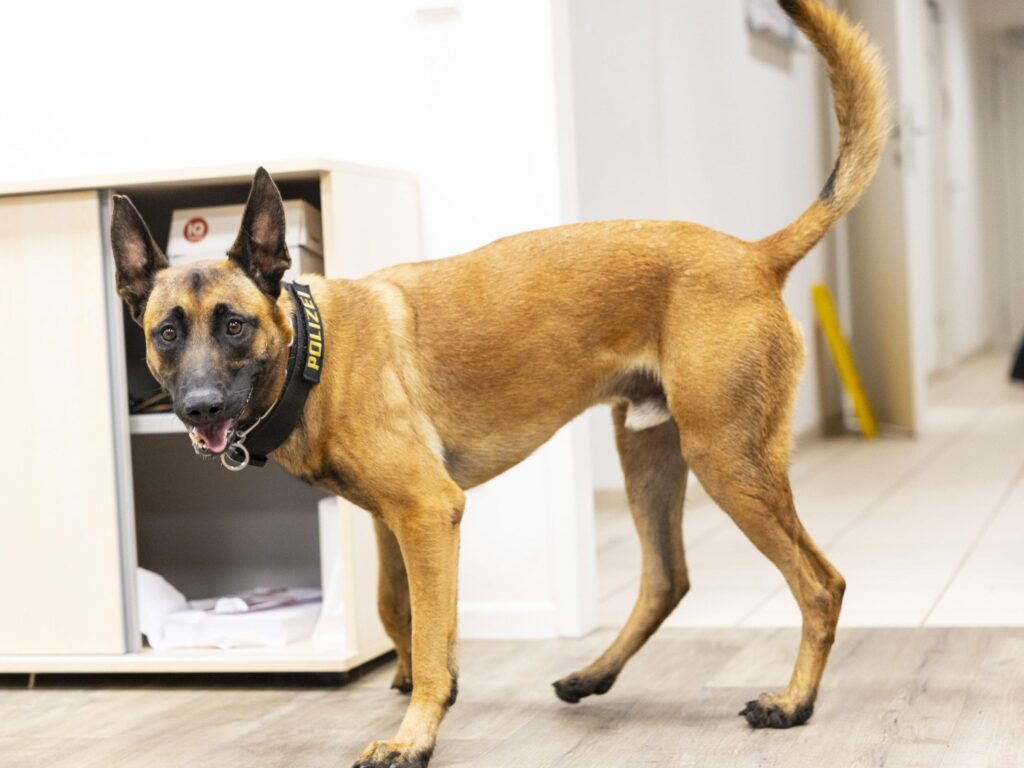
Five specially trained data sniffer dogs have started service with the Austrian police. On Friday, four of them were officially presented with their decrees by Interior Minister Gerhard Karner (ÖVP) at the training facility in Strebersdorf, Vienna-Floridsdorf. The specialized training lasts eight weeks. By the end of the year, a total of eleven data sniffer dogs are expected to be deployed across Austria, announced Franz Ruf, Director General for Public Security.
Police dog training normally takes two years to qualify as a protection and tracking dog, followed by specializations such as corpse detection, drug detection—or now, newly added—data carrier detection. The animals are trained to locate digital evidence such as laptops, cell phones, tablets, e-wallets, USB sticks, SIM cards, as well as cash, counterfeit money, and documents such as passports as quickly as possible. In cooperation with the Bavarian police, this specialized training has now been introduced in Austria. The five dogs—all Belgian and Dutch shepherds—will first serve in Vienna, Carinthia, Salzburg, Styria, and Tyrol. By the end of 2025, all federal states will have service dogs, with up to 30 animals to be trained in the future.
Conditioned To Platinum Scent
The dogs are mainly conditioned to the scent of platinum found in circuit boards of electronic devices. Training is done through clicker training, in which a clicking sound signals the animal it has performed correctly, followed by a treat or toy reward. When a data sniffer dog makes a find, it signals passively by freezing and stopping its sniffing, or actively by barking.
The dogs do not touch the discovered items so as not to destroy evidence, explained training director Bernhard Brüggler. The search is a peak physical performance for the animals, said Rudolf König of the Interior Ministry’s service dog unit. Dogs can inhale and exhale up to 300 times per minute while sniffing. They can only work for 15 to 20 minutes at a time.
Valuable In Investigations Against ATM Explosions
The new search method is valuable for investigations in cybercrime, economic crime, violent crime, extremism, terrorism, stalking, hate crime, and organized crime. “This enables us to carry out house searches, vehicle searches, and even large outdoor searches in a very targeted, efficient, and rapid manner,” Ruf said. Since completing training in July, the data sniffer dogs have already secured €135,000 in cash, 38 data carriers, and 32 passports. They were successfully used in securing evidence in investigations against ATM bombers. Their official start of duty has now taken place.
Interior Minister Karner said that police must also adapt to new criminal methods, with cybercrime being one of the fastest-growing areas in recent years. Cyber competence centers have been established, and the new service dogs are part of this “Cyber Cobra,” described by Karner as “criminal investigators on four paws.” The rapid detection and analysis of modern data carriers will also help prevent attacks, said Jörg Leichtfried (SPÖ), State Secretary for State Security. Such carriers are often well hidden, but the new service dogs “are specialists capable of cracking the best hiding places,” Leichtfried said, something the animals demonstrated before journalists.

